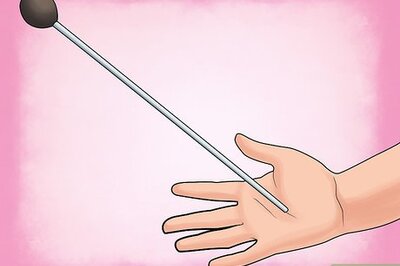
views
Understanding the Terms

Recognize the word origins. Both words originally had very different meanings. While experts aren't 100% sure about where and when the words originated, they have pretty good guesses. The word geek likely originated in the early 1900s from traveling carnivals. A performer called a "geek" would do bizarre and disgusting things to amuse people. This included biting the heads off live chickens. The word nerd may have originated from Dr. Seuss, who wrote the line "A merkle, a nerd, and a seersucker too!" If you don't wish to defile nerddom by calling someone a nerd, you can also call them a "seersucker." However, there are several other possible origins, including "knurd," which is "drunk" spelled backwards and has been used to describe studious people who don't drink or party.

Recognize the main differences between the terms today. Both words are used to describe intellectual people who are interested in certain areas. In some cases, both words may be used to accurately describe the same person. Geeks are eccentric people, often intellectuals, who are passionate about a specific area of interest. They may socialize a lot with people who share this interest. Nerds are intellectual people who tend to be socially clueless. They're often skilled in STEM fields. Sometimes they are stereotyped as unattractive or irritating. Another definition of "nerd" is a four-letter word with a six-figure income.

Avoid judging someone's category using demographics. You can't tell whether someone is or isn't a nerd/geek based on genetics or background. Avoid judging someone based on who they are, what they wear, or how much money they make. Geek and nerd identity are about interests and personality. Race and gender: Despite the white or Asian male stereotype, people of any race and gender can be geeky and/or nerdy. Excluding people based on these categories lands you into a new one: a jerk. Disability: Disability doesn't guarantee or prevent geekery or nerddom. While many autistic people are nerds/geeks, not all of them are. And people with intellectual disabilities can be geeky and nerdy. Economic status: While people talk about how nerds or geeks will become rich, the truth is not all of them will. It's possible for them to struggle financially and/or settle down in a moderate-paying job so that they still have plenty of time for outside interests. Not all of them become the bosses of their high school bullies (and who'd want to manage a difficult person like that, anyway?). Glasses and fashion: While the stereotypical nerd wears glasses, a few of them wear contacts or need no vision correction. It's also possible for nerds to be well-dressed (and for geeks to be poorly-dressed). Also, not all of them dress in "masculine" ways; someone who wears pink dresses can be a geek and/or nerd.

Keep in mind that some people define the words differently. The difference between geeks and nerds has been the subject of much debate. Language is often subjective, so different people may see it differently. Some people believe that one word is empowering and the other is derogatory. But really, both words can be positive. Respect other people's preferences. For example, if someone wants to be called a geek and not a nerd, even if you've noticed they seem nerdy, refer to them the way they prefer.
Comparing Interests

Compare their hobbies and games. Nerds typically enjoy highly intellectual hobbies and games that are done alone or one-on-one. Geeks tend to enjoy pop culture and they may share their interests more often with others. (Of course, many nerds enjoy a few geeky things and many geeks enjoy a few nerdy things.) Geeks often enjoy aspects of pop culture, sometimes with an intellectual focus, alone or with friends. This can include things like board games, film (including favorite directors, composers, or key grips), tech gadgets, hacking, and techno music. Nerds often enjoy aspects of "high culture" and intellectual pursuits, usually alone. Chess, classical music, go, and fine art are examples. Solitary pursuits, like programming and solo gaming, are also common.

Consider whether they focus on collections or achievements. Geeks are fans of something, while nerds are practitioners. Geeks may collect fun products related to their interests, whereas nerds typically only purchase practical equipment related to their interests. Geeks may collect box sets, minifigures, memorabilia, and other things related to their interests. They may also "collect" trivia facts. Nerds typically don't collect things, instead focusing on the pursuit of knowledge.Tip: Of course, it is possible for a non-geeky nerd to have a few objects (like shirts with nerdy jokes) related to their field. They just tend to place less importance on them.

Look at the way they dress, without reading too much into it. Outfits can sometimes hint at whether someone is a geek or nerd. However, since geek and nerd identity are more about behavior, avoid making too many assumptions based on what someone has in their closet. Geeks typically have a unique sense of style (which hipsters have tried to copy). They often wear shirts or pins to display their interests. Nerds focus on practicality instead of how others view them. Clothes may be academic and/or disheveled. If they have bad vision, they usually wear glasses to avoid bothering with contacts.

Notice where they work (or want to work). While nerds and geeks can both hold an array of jobs, their typical preferences vary. Geeks may enjoy a wide array of jobs, such as IT, design jobs (graphic, web, game, etc.), selling records, or bartending. They are well suited for jobs that help them share their passions with others. Nerds typically prefer specialized and intellectual jobs. Programming, rocket science, fine art, engineering, and other technical fields may catch their interest. Many (but not all) are STEM oriented.
Comparing Social Lives

Listen to the way they talk. Geeks and nerds may share similar outward traits — or not — but when you compare their approach to life, the differences become apparent. Obscure language: Nerds tend to use jargon or uncommon words. Geeks tend to use obscure references. For example, when a nerd might say "That's an overused Foley. The SD must be lazy," a geek might say "Oh! I love how Percy Jackson uses the Wilhelm Scream in every movie!" Vocabulary usage: While both nerds and geeks may have a large vocabulary, nerds are more likely to use long or obscure words. Geeks usually use common slang or even abbreviations like "IDK" or "GTG" in conversation. References to interests: Geeks usually talk more about their interests and can get into heated disagreements if someone insults something they like. Nerds are less likely to "talk your ear off." They don't care as much what others think, so they may ignore it if someone insults their area(s) of interest.Tip: Don't rule out nerdiness if someone speaks plainly. Some nerds have decided that since the purpose of conversation is to be understood, clear language is better than complex language.

Look at how social they are. Geeks are usually more sociable than nerds, though this varies. People from both categories may or may not be socially awkward. Geeks may socialize in a more typical way, though they can be long-winded about their passions. Nerds are often very introverted. They are also more likely to be awkward or quiet in social interactions, since they feel most comfortable studying or practicing an activity.

Notice what type of romantic partner they tend to seek out. Geeks can fall for anyone, though dating a fellow geek who shares their interests can be a bonus. Nerds usually prefer to date nerds. Some nerds find dating very challenging, since they spend most of their time in academic pursuits.Tip: Avoid jumping to conclusions based on who someone does (or doesn't) date. For example, some geeks may prefer to date nerds, and some nerds may be good at flirting. And a lack of interest in dating may mean that someone is aromantic and/or asexual, which isn't related to being geeky or nerdy at all.

Enjoy the differences. Geeks, nerds, dweebs, dorks, twerps, dolts, and norms all have their niche, and all have something to contribute to this great world of ours. It's fun to laugh and draw out stereotypes, but keep in mind that everyone has value and that harmless differences make the world a more interesting place. Many nerds are part geek and many geeks are part nerd. Some people are clearly both.


















Comments
0 comment